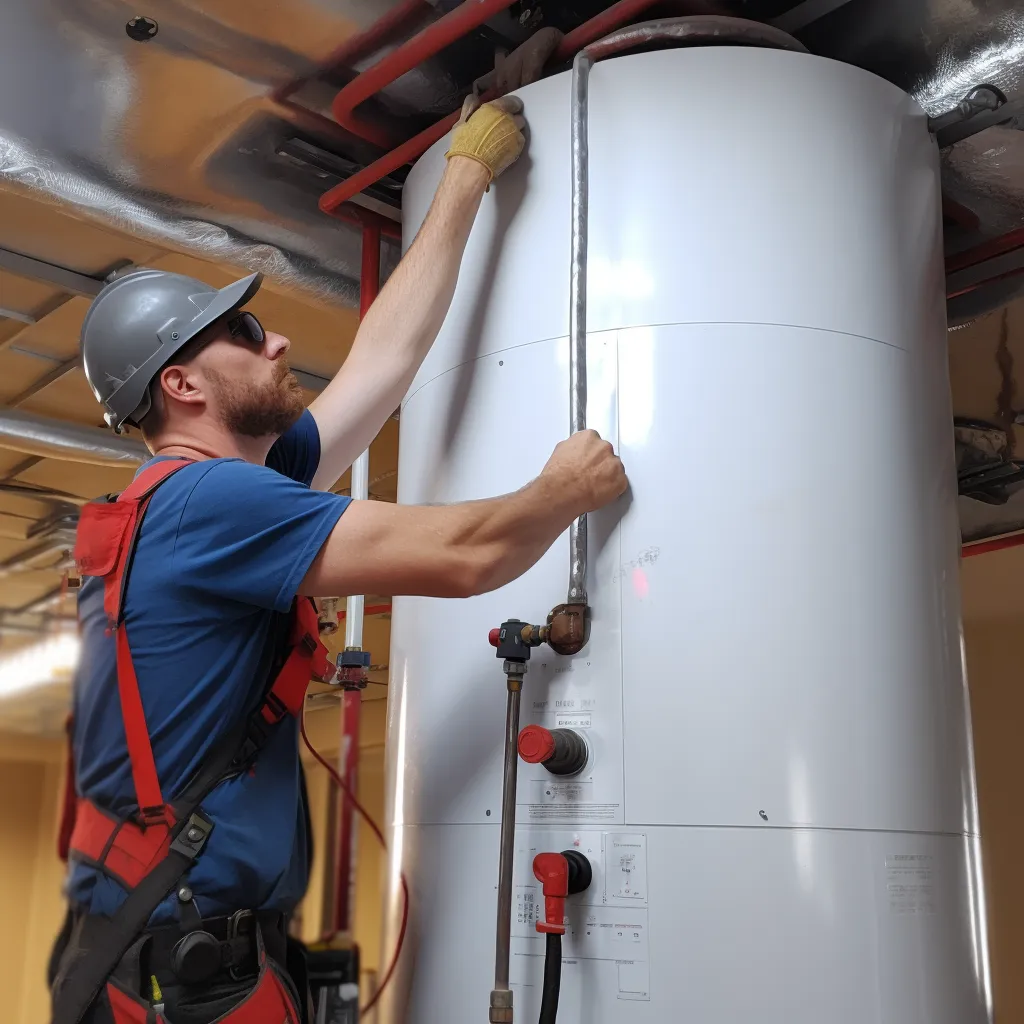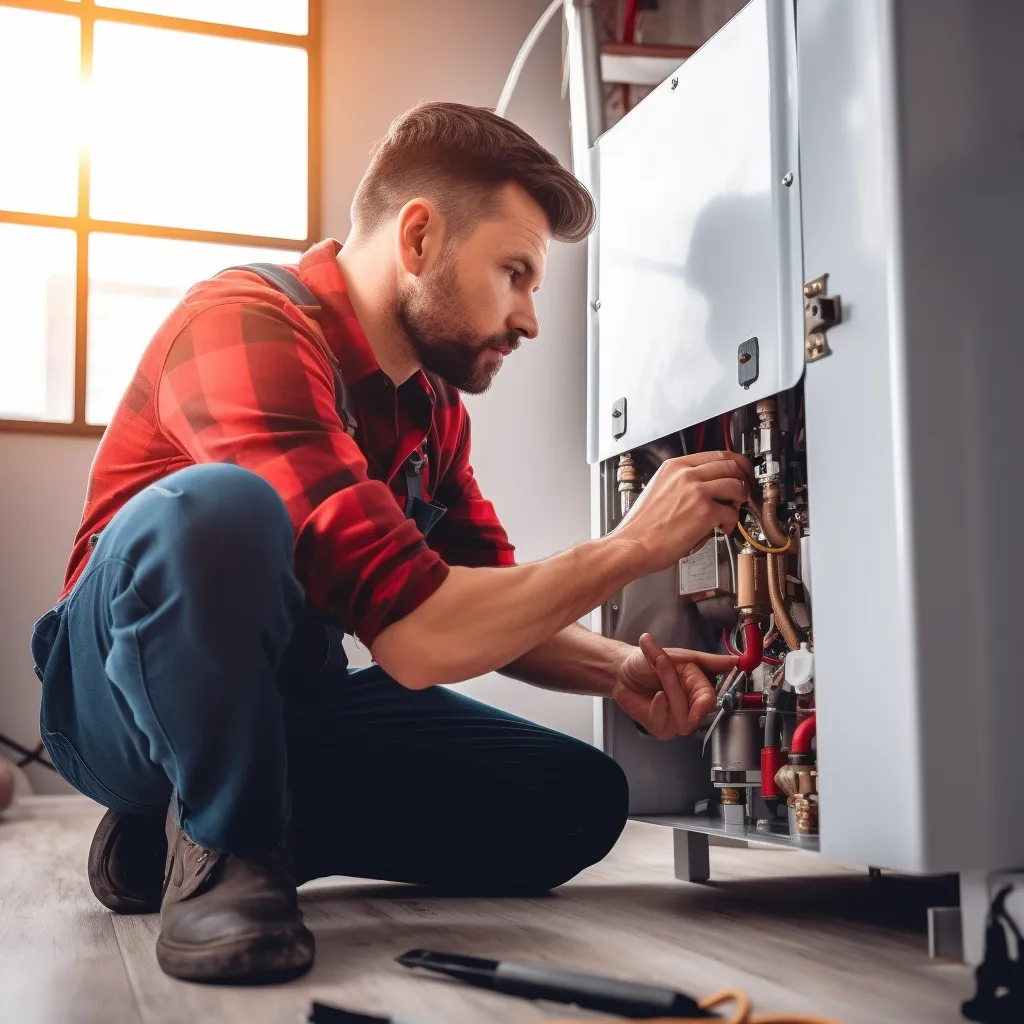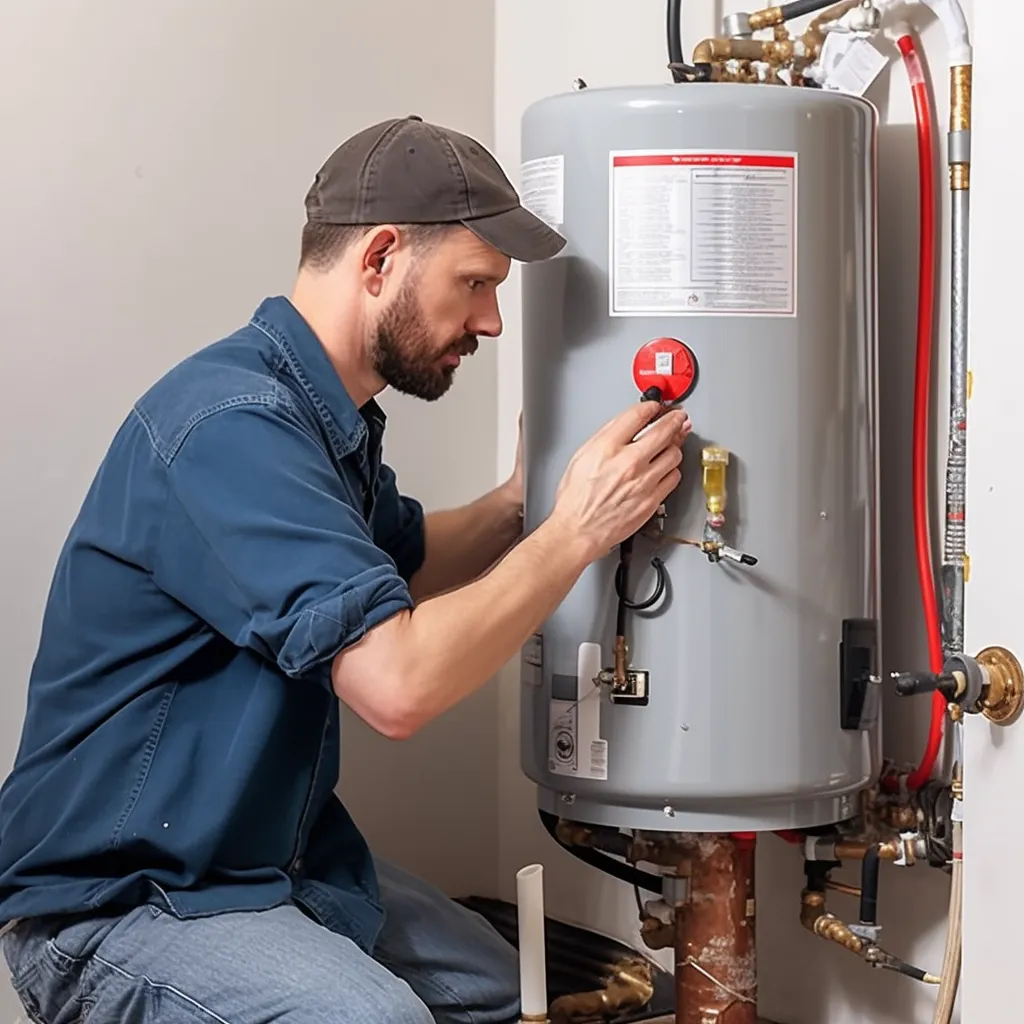Common Plano Water Heater Myths: Discover the Truth
If you're a homeowner in Plano, Texas, and you're experiencing issues with your water heater, you may be considering water heater replacement. It's important to have accurate information to make informed decisions. Unfortunately, there are several myths surrounding water heaters that can cloud your judgment. That's why we've put together this informative guide to debunk common water heater myths. In this guide, we'll provide you with reliable information to help you separate fact from fiction. We understand that it can be confusing when you hear conflicting advice, especially when it comes to an essential appliance like your water heater. That's why we've done the research for you, compiling useful insights and surprising revelations about water heaters. Whether you're unsure if your water heater needs replacement or just looking to upgrade your current system, this guide will provide you with the knowledge you need. We'll tackle common myths like "You can't replace a water heater yourself" or "Water heaters last forever." By dispelling these myths, we aim to give you a clear understanding of what it takes to maintain a functioning water heater. Don't let myths and misinformation lead you astray when it comes to your water heater replacement in Plano. Arm yourself with reliable information and make confident decisions for your home. Explore our comprehensive guide today and discover the truth about water heaters.

Myth #1: They last forever
One common misconception surrounding water heaters is that they last forever. While it's true that water heaters are robust appliances that can provide many years of reliable service, they do have a finite lifespan. Over time, factors such as wear and tear, sediment buildup, and the overall quality of the unit can contribute to its deterioration. Consequently, it's essential to be aware that water heaters will eventually need to be replaced, even if they have been diligently maintained.


Myth #2: All water heaters are the same
Many homeowners often assume that all units are created equal. However, this is far from the truth. There are various types and models of water heaters available in the market, each with its own set of features and advantages. So, if you're in need of a water heater replacement in Plano, it's important to understand that not all water heaters are the same. Choosing the right water heater for your home requires careful consideration of several factors such as your hot water needs, energy efficiency, and available space. The two most common types of water heaters are tankless water heaters and traditional tank-style water heaters. Tankless water heaters are becoming increasingly popular due to their energy-efficient nature. Unlike traditional tank-style water heaters, they heat water on-demand, eliminating the need for a large storage tank. This not only saves space but also provides a constant supply of hot water, making it ideal for households with high hot water usage. On the other hand, traditional tank-style water heaters store a predetermined amount of hot water in a tank. When the hot water is depleted, it takes time for the tank to refill and reheat the water. While these units are generally less expensive upfront, they may consume more energy and take up more space. In addition to the type of water heater, you should also consider factors such as fuel source, efficiency ratings, and maintenance requirements. For example, some water heaters may be powered by electricity, natural gas, or propane, each with its own advantages and disadvantages. Additionally, efficiency ratings such as Energy Factor (EF) can help you determine the unit's energy efficiency and potential cost savings.

Myth #3: You get more hot water with a bigger tank
Many people believe that getting a larger water heater tank will automatically result in having more hot water available. However, this is actually a common misconception. The size of the tank does not directly determine the amount of hot water that can be produced. When it comes to water heater replacement in Plano, it's crucial to understand that the key factor in determining hot water capacity is the recovery rate. The recovery rate refers to how quickly the water heater can heat up a new batch of water once the existing supply has been depleted. The size of the tank simply determines how much water can be stored at a given time. If you have a larger tank, it will take longer to deplete the hot water supply. However, once the tank is empty, it will still take the same amount of time for the water to heat up again, regardless of the tank's size. Rather than focusing solely on tank size, it is important to consider the specific needs of your household. Factors such as the number of people in your household, their hot water usage patterns, and the size of the storage space should be taken into account.


Myth #4: You can DIY with water heater repair or replacement
One common misconception about hot water heaters is that they can be repaired or replaced by homeowners themselves. While it may seem like a cost-effective solution at first, attempting to tackle a water heater repair or replacement project without professional assistance can lead to potentially dangerous and costly consequences. When it comes to upgrading your water heater, it is always recommended to rely on the expertise of trained professionals. These professionals have the necessary knowledge, skills, and tools to properly install or replace a water heater in a swift and efficient manner. Not only does hiring a professional ensure the safety of your home and family, but it also guarantees that the job is done right the first time. They will assess your current water heater, determine if replacement is necessary, and provide a detailed analysis of the most suitable options for your Plano home. By entrusting a certified plumbing professional with your water heater repair or replacement, you can have peace of mind knowing that all necessary permits and codes are met. Additionally, they can recommend energy-efficient models that will help you save on your monthly utility bills in the long run.

Myth #5: Water heaters don't need flushing
There is a common misconception that your water heater does not need to be flushed regularly. However, this could not be further from the truth. Flushing your water heater is an essential maintenance task that should not be overlooked. Over time, sediment accumulates at the bottom of your water heater tank. This sediment can consist of minerals, rust, and debris from the water supply. If left unattended, this sediment can cause numerous problems. It can reduce the efficiency of your water heater, leading to higher energy bills. It can also corrode the tank, causing leaks and potential water damage. Flushing your water heater removes this sediment buildup and ensures that your unit operates at optimal efficiency. It is recommended to have your water heater flushed at least once a year or more frequently if your water supply is particularly high in sediment. Regular flushing can extend the lifespan of your water heater and prevent the need for premature replacement.


Myth #6: You can keep an old water heater and save money
One common misconception that homeowners often have is that keeping an outdated water heater can save them money. This couldn't be further from the truth. In reality, an outdated water heater can cost you more in the long run. When it comes to water heaters, technology has come a long way. Newer models are designed to be more energy-efficient, ultimately saving you money on your monthly energy bills. Older water heaters, on the other hand, tend to be less efficient and can lead to increased energy consumption and higher costs. Not only do outdated water heaters consume more energy, but they also experience more frequent breakdowns and require more repairs. These unexpected expenses quickly add up and can become a financial burden for homeowners. Additionally, older water heaters have a higher risk of leaks and water damage, which can lead to costly repairs and even potential health hazards if mold or mildew growth is left untreated. By investing in a new water heater, you can enjoy the benefits of a more energy-efficient and reliable system. Newer models have advanced features such as improved insulation and better temperature controls, ensuring that you have access to hot water whenever you need it, without wasting unnecessary energy. Furthermore, by replacing your outdated water heater with a newer model, you may qualify for government incentives or rebates aimed at promoting energy efficiency. These financial incentives can help offset the upfront cost of a new water heater, making it a more affordable and cost-effective option for homeowners.

Myth #7: Bigger water heater tanks are more energy efficient
It is essential for homeowners to understand the importance of a properly sized water heater and debunk common myths around it, including the misconception that a bigger water tank is more energy-efficient. Contrary to popular belief, a larger water tank does not necessarily equate to better energy efficiency. In fact, it can lead to unnecessary energy wastage and increased costs. The key to maximizing energy efficiency lies in choosing the right-sized water heater for your specific needs. When determining the appropriate size for a water heater replacement in Plano, factors such as the number of occupants in the house, hot water usage patterns, and peak demand should be taken into consideration. Opting for a water heater that is too large for your needs means the unit will heat more water than necessary, resulting in wasted energy. Furthermore, larger tanks require more energy to maintain the stored water at a constant temperature. This continuous energy consumption not only adds to your utility bills but also increases your carbon footprint, leading to unnecessary environmental harm.


Myth # 8: There's no problem with cranking up the water temperature
One of the most common misconceptions about water heating is the belief that cranking up the water temperature is a good idea. Many people think that by increasing the temperature of their water heater, they will have access to hotter water and a more efficient heating system. However, this myth is not only false but can also have various negative consequences. First and foremost, setting your water heater at an excessively high temperature can pose a serious safety hazard. Scalding injuries can occur when the water temperature is too high, especially for children, the elderly, or anyone with sensitive skin. In fact, water temperatures above 120 degrees Fahrenheit can cause severe burns within seconds of contact. Additionally, cranking up the water temperature can lead to higher energy bills. The more heat your water heater has to produce, the more energy it consumes. By keeping the temperature unnecessarily high, you're wasting energy and increasing your utility costs. It's worth noting that most households find a comfortable and safe temperature setting at around 120-140 degrees Fahrenheit. Another drawback of setting the water temperature too high is the accelerated wear and tear it puts on your water heater. Higher temperatures cause increased corrosion and mineral buildup within the tank, resulting in a shorter lifespan for the unit. This leads to more frequent water heater repairs and, eventually, the need for a replacement.

Myth #9: There's no problem setting your water heater to the highest temperature
One common misconception is that setting your water heater to the highest temperature is the way to go. However, this is far from the truth. Setting your water heater to the highest temperature is not only unnecessary but also potentially dangerous. While it may seem like a good idea to have hotter water readily available, there are several reasons why it is not recommended. Firstly, setting your water heater to the highest temperature puts you at risk of scalding. Water that is too hot can cause severe burns, especially for children or the elderly. By keeping the temperature at a moderate level, you can ensure the safety of everyone in your household. Secondly, having a water heater set to a high temperature can lead to energy wastage. The hotter the water, the more energy it takes to heat it up. This can significantly increase your energy bills and have a negative impact on the environment. By setting the temperature to a lower, yet still comfortable level, you can save both energy and money. Lastly, excessive heat can shorten the lifespan of your water heater. The constant exposure to high temperatures can cause wear and tear on the system, leading to more frequent repairs and ultimately the need for a premature water heater replacement.


Myth #10: Water heaters waste energy
There is a common myth that water heaters waste a significant amount of energy. However, this is not entirely true. While it is true that older water heaters may be less efficient and therefore use more energy, modern water heaters have made great strides in energy efficiency. Homeowners can rest assured knowing that there are options available that not only provide ample hot water but also reduce energy waste. One popular choice is a tankless water heater, which heats water on demand rather than continuously heating a large tank of water. This means that energy is only used when hot water is needed, resulting in significant energy savings. Another option for energy-conscious homeowners is a heat pump water heater. These innovative systems use electricity to move heat from the surrounding air to heat the water, making them extremely efficient. In fact, heat pump water heaters can be up to three times more efficient than conventional electric water heaters. Furthermore, it is important to consider proper maintenance and insulation to maximize energy efficiency. Regularly flushing and cleaning your water heater can help it operate at peak performance, while insulating the tank and pipes can prevent heat loss.

Myth #11: Regular water heater maintenance isn't necessary
One myth is that regular maintenance for a water heater is unnecessary. Many homeowners believe that as long as their water heater is functioning properly, no additional upkeep is required. However, neglecting routine maintenance for your water heater can result in a shortened lifespan, reduced efficiency, and the need for premature replacement. In Plano, a city known for its scorching summers and chilly winters, the demand for hot water is a year-round necessity. Therefore, ensuring that your water heater is in optimal condition should be a top priority. Contrary to popular belief, regular maintenance for a water heater is essential, and it is recommended to schedule annual check-ups by a licensed plumber who specializes in water heater replacement in Plano. During these routine inspections, a skilled technician will examine various components of your water heater to identify any signs of wear and tear. They will check for sediment buildup, which commonly occurs within the tank over time. Sediment accumulation can lead to insulation issues, decreasing the heater's efficiency and causing it to work harder than necessary. Additionally, it can contribute to corrosion and premature failure of the heating elements. The anode rod is another crucial component that requires regular inspection. This sacrificial rod is designed to corrode over time to prevent corrosion of the tank. If not replaced when necessary, the tank's inner lining can begin to corrode, leading to leaks and potentially costly water damage. By having the anode rod inspected and replaced as needed, you can extend the lifespan of your water heater and avoid the need for a premature replacement in Plano. Another aspect of water heater maintenance is ensuring that the pressure relief valve is functioning correctly. This safety feature regulates the pressure within the tank, preventing potential explosions. Regular testing of this valve during maintenance visits can prevent catastrophic failures and preserve the longevity of your water heater.


Myth #12: You can use any type of water heater in the home
There seems to be a common misconception that any type of water heater can be used in a home. However, this is simply not true. In reality, selecting the right water heater for your home is crucial for optimal performance and efficiency. Plano residents looking for water heater replacement must consider various factors before making a decision. The size of the home, the number of occupants, and the specific needs of the household are all important considerations. Additionally, the fuel source and available space in the home are also significant factors to take into account. Choosing the wrong water heater can result in various issues. For instance, using an electric water heater in a home that only has natural gas connections can be problematic. It may require costly modifications to the home's infrastructure. Similarly, using a smaller water heater in a larger household can lead to insufficient hot water supply, causing inconvenience and discomfort. To ensure efficiency and effectiveness, it is important to consult with a professional plumber or water heater specialist. These experts have the knowledge and experience to assess your specific needs and recommend the most suitable water heater for your home. They can guide you through the available options, such as tankless water heaters, electric or gas-powered units, and help you make an informed decision.

Myth #13: Hard water damages your water heater
A common misconception is that hard water can damage your water heater. However, this is not entirely true. While it's true that hard water contains high levels of minerals, such as calcium and magnesium, these minerals do not directly harm your water heater. The minerals may accumulate on the heating elements or the inside of the tank over time, forming a layer of sediment. This buildup can reduce the efficiency and lifespan of your water heater if left untreated. To combat this issue, regular maintenance is necessary. Flushing your water heater annually can help remove the sediment buildup and improve its overall performance. Additionally, installing a water softener can prevent the minerals from depositing in your water heater and other plumbing fixtures. Plano residents who are concerned about hard water and its potential impact on their water heater should consider scheduling a water heater replacement service. By replacing an older, inefficient unit with a newer, more energy-efficient model, you can combat any potential issues associated with hard water. Plumbers iare equipped with the expertise and tools to ensure a smooth water heater replacement process. Remember, while hard water can lead to sediment buildup and decrease the efficiency of your water heater, it doesn't directly damage the unit. By understanding the facts and taking proactive measures, such as regular maintenance and water softening solutions, you can prolong the life of your water heater and enjoy hot water without any worries.


Myth #14: Tankless water heaters are more costly
There is a common misconception that tankless water heaters are more expensive than traditional tank water heaters. However, this is not entirely accurate. While the initial cost of a tankless water heater may be higher, the long-term savings and benefits outweigh the upfront investment. Tankless water heaters, also known as on-demand water heaters, heat the water directly as it flows through the unit without the need for a storage tank. This means that there is no standby heat loss like with traditional tank heaters, where energy is wasted to keep a large volume of water hot at all times. By only heating water when it is needed, tankless water heaters can significantly reduce energy consumption and, as a result, lower utility bills. Studies have shown that homeowners can save up to 30% on their energy bills by switching to a tankless system. In addition to energy savings, tankless water heaters have a longer lifespan compared to traditional models. While tank water heaters typically last around 10-15 years, tankless units can last up to 20 years or more with proper maintenance. This longer lifespan translates to fewer replacements and further cost savings in the long run. Furthermore, tankless water heaters take up less space than tank models, making them ideal for smaller homes or apartments where space is limited. They can be mounted on a wall, freeing up floor space and allowing for more flexibility in installation. Lastly, tankless water heaters provide an endless supply of hot water. With a traditional tank water heater, there is always a risk of running out of hot water if multiple appliances are used simultaneously. Tankless units, on the other hand, heat the water on-demand, ensuring a constant and continuous supply of hot water whenever it is needed.
Contact Us
GET IN FULL TOUCH
PHONE (469) 838-5525
EMAIL:
jason@waterheatersinplanocom
Evolution Plumbing
Plano, TX 75023
Texas Plumbers License: M-44821
